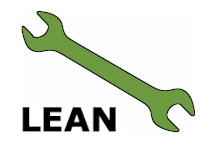
What is Poka-Yoke
Poka-Yoke (Error Proofing) is the principle of incorporating error detection and prevention into the design of production processes.
Why Poka-Yoke
General advantages
- Making it impossible to make mistakes (or at least makes them easy to notice)
- It simplifies training
Reduces waste types
When to use Poka-Yoke
Essential conditions
None
N/A
Non-essential conditions
None
N/A
How to implement and use Poka-Yoke
Implementation
Levels of Poka-Yoke (Error Proofing) designs:
- Good = Defects are detected before continuing to the next process
- Better = Defects are detected when an error is made
- Best = It is impossible for errors to occur
Good designs:
- Are automatic
- Are simple
- Are inexpensive
- Give prompt feedback
- Give prompt action(prevention)
E.g. a power plug that fits only one way.
Use
- The operator uses it by default because it is incorporated into the design.
Where to find it
IASSC Body of Knowledge:
Lean: 22
Yellow ➔ Understand
Green ➔ Analyze
Black ➔ Create
Lean Six Sigma: 5.1.3
Yellow ➔ Apply
Green ➔ Apply
Black ➔ Apply
Lean tools are great. Results are better.
Take the next step with Procestimal — expert-designed modules that help you apply Lean with real-world impact.
Try it free for 30 days — no credit card, no pressure.
About the Author
Floris Lap is an IASSC-certified Lean Six Sigma Black Belt and founder of Procestimal. He empowers organizations to maximize value and reduce waste through practical Lean Six Sigma solutions—contributing to a more sustainable world where businesses thrive with minimal resources. Contact us
Last updated on:
